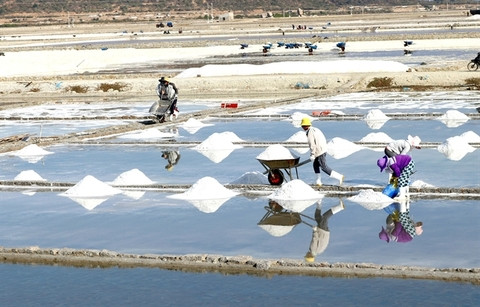
The salt industry in Việt Nam needs new strategies to develop sustainably and efficiently, experts said. — VNA/VNS Photo Nguyễn Thành
Việt Nam has a number of advantages in salt production, including a 3,200km coastline and favourable natural conditions, but is affected by small-scale and scattered production and a lack of industrial methods, which affect quality and productivity.
Besides, the low incomes it fetches means the salt production area fell to just 11,000ha last year from 13,160ha in 2017, according to the Department of Agriculture and Rural Development.
Producers have switched to aquaculture and other occupations, leaving many salt farms abandoned.
Besides, only 14 out of 73 salt production facilities in the country have adopted technology and industrial methods, which leads to a decrease in production capacity.
Extreme competition in the global market and insufficient funding had prevented many of them, including his, from growing, Phạm Thanh Chương, director of Thanh Chương Iodine Salt Trading Production Co., Ltd., said.
Hồ Xuân Vinh, director of ABACA Việt Nam Co., Ltd, said on the other hand, some had adopted hi-tech methods to make a variety of products such as naked and low-sodium salts only to see consumers unable to differentiate between them.
To build an efficient salt industry, it was necessary to tap the full potential of production areas, improve productivity and quality, and diversify products to meet consumers’ needs in the local and export markets, Lê Đức Thịnh, head of the department, said.
Vinh said the Ministry of Agriculture and Rural Development should be a channel to connect enterprises with co-operation opportunities to develop a sustainable value chain and ensure steady incomes for farmers, promote the industry’s products, and set standards and guidelines to enhance quality.
Lục Mạnh Tùng of Agritech Vietnam Investment and Trading JSC said his company had been working with the Ministry of Agriculture and Rural Development to help increase the capacity of farmers and co-operatives.
It had also set up a fund together with the Department of Agriculture and Rural Development to provide soft loans to co-operatives, he added.
The ministry has a salt industry development project for 2021-25 in Nam Định, Thái Bình, Phú Yên, Khánh Hòa, Ninh Thuận, Bến Tre, and Bạc Liêu provinces.
It plans to foster the industry by developing infrastructure, adopting industrial production methods and technology, building geographical indications and brands, and soliciting investment.
Plans are also afoot to combine salt production and tourism to promote the industry on a global scale. — VNS